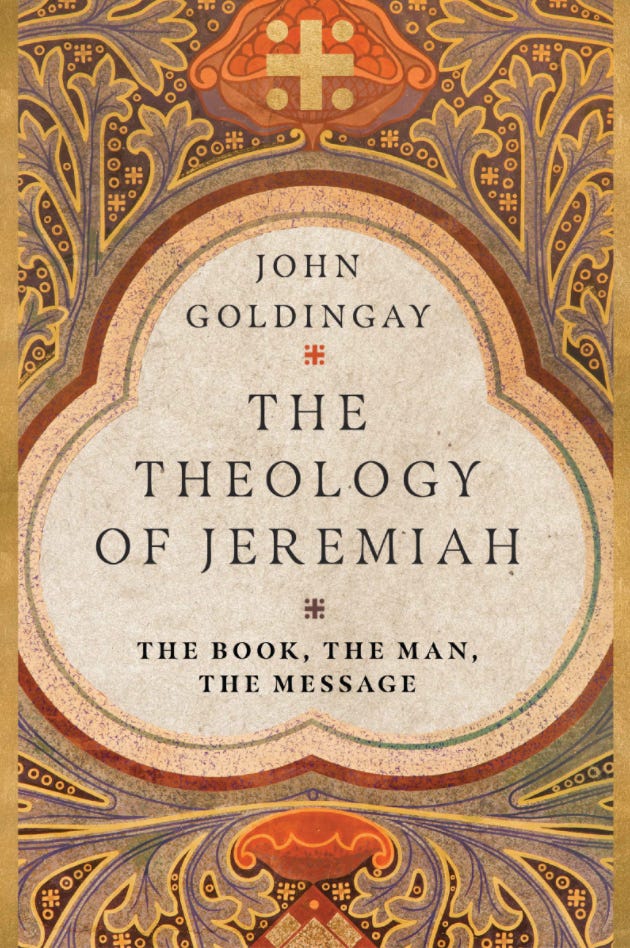When the Prophet Tells You to Let Go(d)
In the midst of crises like our pandemic, our pastors and preachers and prophets call us to trust God. Sometimes it doesn’t make a bit of sense. Sometimes their words strike us weird, impractical, and over the line. Sometimes their words are too religious.
John Goldingay’s wonderful new book, The Theology of Jeremiah: The Book, The Man, The Message, opens up the real life story of a prophet (a pastor, a preacher) as he calls Jerusalem to trust what God is doing. His message, however, disturbed the king (Zedekiah) and leaders and those who thought a more political solution was at hand. For many his message was unacceptable.
We need to admit a profound reality, and this one strikes home with our people: Jerusalem was vulnerable and weak and afraid. It needed a big faith to think they could win a battle with Babylon. Calling people to faith at times asks for they may perceive as impossible. It’s not hard to see their point of view. Jerusalem, we sometimes forget, was a buffer zone between Babylon and Egypt, two world powers. The northern one, Babylon, wanted to own the world. Israel had a history of thinking the southern one, Egypt, was the kind of political ally they needed for protection.
Babylon was on the move and was growing and was increasingly breathing down the necks of Jerusalem. They thought they deserved control of the economic trade routes. So did Egypt of course, but Babylon grabbed the headlines because Babylon was marching and wanting control.
The people of Jerusalem – leaders and city folks and rural farmers – took sides almost like it was election season. Some though the solution was to enlist Egypt for protection. Others knew Babylon was going to dominate the region and wisdom was on the side of compromise, complicity – yea, “Let’s surrender to them and we will be safe.”
Jeremiah was on God’s side. The ones for the Babylon solution thought Jeremiah was with them but Jeremiah was on God’s side.
That’s the only way to say it because that’s what prophets do. They stand with God regardless of what the people thinks. He was dead-set against those who favored siding with Egypt. He believed God, their God, uses nations to discipline Judah for its covenant unfaithfulness. So God inspired him to tell Judah and Jerusalem and the priests and kings that God was using Babylon so they might as well know it. The king Zedekiah locked him up. Jeremiah was not afraid in spite of his awful relationship with the king. The oddity of all is that Jeremiah ends up in Babylon as the prophet against Judah but seemed to die in Egypt (we don’t know for sure).
Some people liked Jeremiah. Those who did favored the Babylon solution. Others didn’t like him. Those who favored the Egypt solution.
Jeremiah’s message can be summarized as Goldingay says it:
There’s a story about a man who fell over a cliff but managed to grab hold of a tree branch to stop him falling to his death. He called out, hoping to attract the attention of someone who could help him: “Is there anyone there?” A voice came from the heavens: “Let go and I’II catch you.” The man thought for a moment and eventually called out, “Is there anyone else there?” Through the decade of Zedekiah’s reign, Jeremiah gave people one crazy option: surrender to the Babylonians and things will work out, Most people never believed him. But it’s never over until it’s over, and God kept giving another chance to the city, its people, and its king. But they resolutely refused their chances, and eventually it was over -- at least, it was for Jerusalem for Zedekiah.
Jeremiah often must have thought his message was useless. “It would be easy to imagine Jeremiah thinking that his life and ministry had been pointless,” and we can understand that. He add this, and it’s a good word for today: “You have no idea what God will do with your life and how God will bless people through you without your knowing it.” Think about it: we’re reading Jeremiah’s prophecies today!






I will get used to this approach to blog posts and learn again to ask questions in the post, but these come to mind for me: What are you hearing about trust and faith during the pandemic? How has the language of trust in God been received in your community?